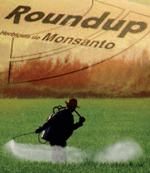|
Science hits GM crops while China stops sowing
|

Photo; Navdanya International
|
Far from putting an end to the hunger in the world and from improving farmer’s quality of life, genetically modified organisms (GMOs) are raising food insecurity and health hazards and failing to increase the yields of crops, according to new scientific studies. And now Chinese authorities prepare to ban the commercialization of transgenic rice and wheat for the next five to ten years, as reported the Third World Network.
Read more
|
Protests to “make sure economy and democracy work together”
Tens of thousands people took the streets of New York, Vancouver, Madrid, Rome and dozens of other cities in North America, Europe and other regions last weekend, to protest against corporate greed and the steps taken by the governments to put an end to the economic and financial crisis. This movement “is taking off all over the world,” said Armine Yainizyan, expert with the Canadian Center for Policy Alternatives, one of the focal points of Social Watch in that country.
Read more
Nepal: Activists want the World Bank out from the Green Climate Fund
The Nepalese Campaign for Climate Justice Network (CCJN) and other groups organized a demonstration on Oct. 12 near the office of the World Bank in Kathmandu against the role of that international financial institution in the Green Climate Fund.
Read more
Egypt: Authorities accused of inciting sectarian violence
Twenty-one human rights organizations (among them the Egyptian Association for Community Participation Enhancement, focal point of Social Watch in that country) accused this week the interim government in Cairo and the Supreme Council of the Armed Forces of inciting the sectarian violence that caused almost 30 deaths this month in Maspero.
Read more
Unicef experts call to ramp up social spending to support economic recovery
It is often argued that social and economic investments that benefit children and poor households are not affordable or that government expenditure cuts are inevitable during adjustment periods. But a paper published by Unicef shows valid alternatives, even in the poorest countries.
Read more
|
